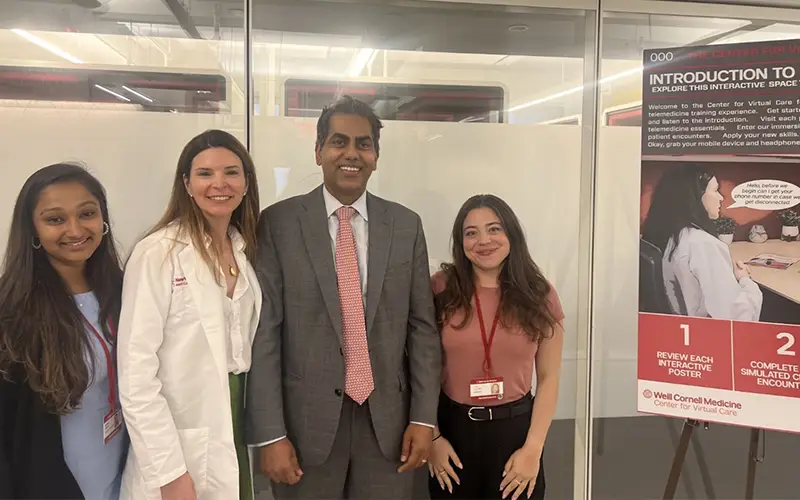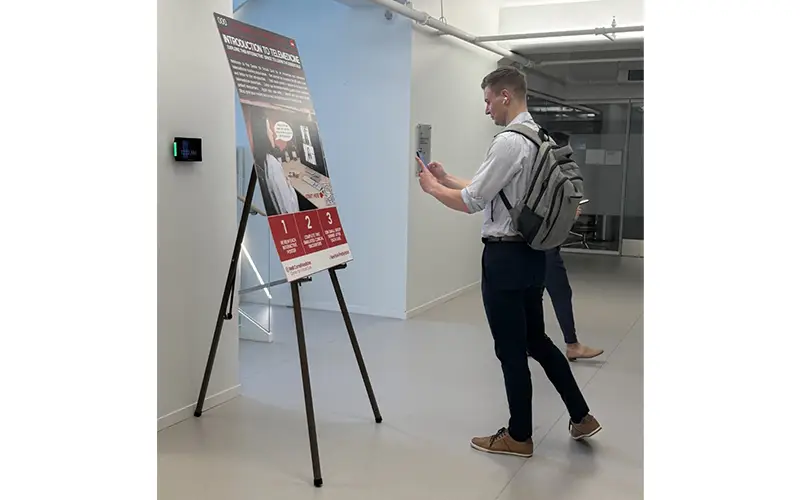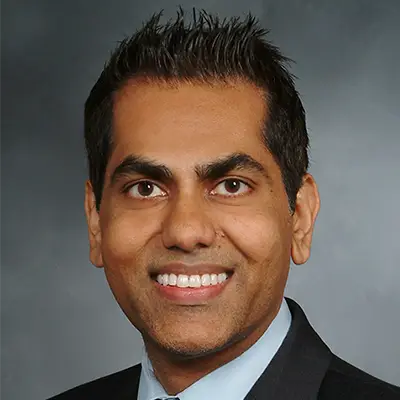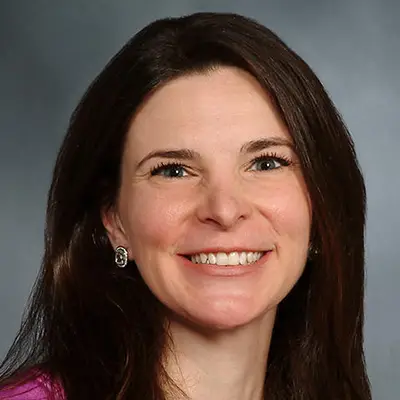A new curriculum from NewYork-Presbyterian’s W. P. Carey Residency Program and the Weill Cornell Medicine Center for Virtual Care aims to give first-year residents and fellows a foundation in providing high-quality telemedicine care. “Doctoring in the Digital Age” uses simulated patient visits to provide an interactive and comprehensive learning experience to enable learners to conduct successful telemedicine visits.
These simulated patient visits offer real-time review and feedback from faculty to effectively leverage in-person clinical skills in a virtual setting, and the basics of self-presentation, communication and professionalism. The NYP enterprise-wide course also includes self-paced online modules and group debrief sessions that help learners efficiently navigate technology management, patient safety, the legal and regulatory framework for telemedicine, and equitable access to technology, in addition to teaching skills for performing remote examinations.
“This isn’t just a lecture that you’re going to listen to for four or five hours, it’s intensive and interactive,” says Rahul Sharma, MD, MBA, Emergency Physician-in-Chief for NewYork-Presbyterian and Weill Cornell Medicine and Founder and Executive Director of Weill Cornell Medicine’s Center for Virtual Care. “It involves preparation sessions, online modules, simulated encounters, and detailed debriefs and case discussions with experienced telemedicine faculty.”

CVC Education Team formalize the kick off of the NewYork-Presbyterian GME Foundational Telemedicine Course (L to R: Marcia Tilku, Dr. Kristie Busch, Dr. Rahul Sharma , Ariel Sulcov)
The course kicked off its first post-pilot cohort in June 2024 and now trains over 500 first-year residents and fellows. In fact, it is now an expected part of first-year residency training, making NewYork-Presbyterian one of the only hospital systems in the country that makes foundational telemedicine education an integrated part of intern orientation.
NYP Leads the Way
In 2021, the Association of American Medical Colleges (AAMC) and the Accreditation Council for Graduate Medical Education (ACGME) developed a set of six telehealth competencies for graduates of medical school and residency, which are reflected in the “Doctoring in the Digital Age” curriculum. However, these skills aren’t new to NewYork-Presbyterian – the health system has been practicing telemedicine and developing education around it since 2016.
“From there we realized that we had something that others didn’t, and that is why the Center for Virtual Care focuses on three dynamics in addition to patient care: education, research, and innovation,” says Kristie Busch, DO, an emergency medicine physician at NewYork Presbyterian and Weill Cornell Medicine and Director of Education at the Center for Virtual Care at Weill Cornell Medicine.
Weill Cornell Medicine’s Center for Virtual Care officially launched in 2019 and has trained clinicians across the NewYork-Presbyterian system, including physicians, medical students, physician assistants, nurse practitioners, nurses, and care managers, using both live courses and patient simulations. The simulations are conducted using HIPAA-compliant booths where clinicians engage with patients on a virtual platform.
“Medical students are always trained in bedside manner but there’s actually ‘webside’ manner too,” Dr. Busch says. “It’s not just about turning on Zoom; there’s so much more to it.”
Medical students are always trained in bedside manner but there’s actually ‘webside’ manner too. It’s not just about turning on Zoom; there’s so much more to it.
— Dr. Kristie Busch
Scaling Up
Over the last two years, the Center for Virtual Care had been working with NewYork-Presbyterian’s Graduate Medical Education office on how to expand telemedicine education for interns and fellows. In 2023, NewYork-Presbyterian received a transformative philanthropic gift from the W. P. Carey Foundation to establish the W. P. Carey Residency Program, which implemented the foundational training for all new interns and fellows across the system.
“Given the rapid growth in telemedicine, it is imperative that we are at the forefront of innovation as we train this next generation of physicians,” said Dr. Lauren Wasson, Chief Academic Officer and Vice President of Graduate Medical Education at NewYork-Presbyterian.
Given the rapid growth in telemedicine, it is imperative that we are at the forefront of innovation as we train this next generation of physicians.
— Dr. Lauren Wasson
In March 2023, the Center for Virtual Care designed a pilot program which customized their training curriculum to fit into the intern orientation schedule. The program now includes asynchronous online courses, in-person sessions and patient simulations followed by a debriefing to review the experience.
The in-person training includes staging the room for a telemedicine visit, understanding the medicolegal landscape, enhancing communication skills, preparing for technical challenges and virtual physical examination techniques.

Intern uses interactive QR coded poster to prepare for first simulated patient encounter.
“Normally in an emergency department or a clinical office setting, everything is set up for you. In this space, you have to create it all,” Dr. Busch says. “You have to make sure you have a professional background, and you have technology that works.”
The course prepares learners for handling the nuances of legal and regulatory requirements of providing care via a virtual platform. The simulations also help interns experience how a virtual visit can be different for the patient. The training emphasizes that clinicians should narrate their actions so that patients can understand what’s happening if the clinician looks offscreen to type in the electronic medical record, for instance.
“Our verbal and nonverbal communication skills are extremely important in this space because they can affect the entire patient experience. What if I turned my head and started talking and was distracted? That would take away from the experience and compromise patient engagement,” says Dr. Sharma.
Our verbal and nonverbal communication skills are extremely important in this space because they can affect the entire patient experience.
— Dr. Rahul Sharma
According to Dr. Sharma, learners are often surprised that they can conduct an effective physical exam during a telemedicine visit. During the training, learners are taught how to observe breathing patterns and to enlist the patient to measure their heart rate or palpate their abdomen “There are many tricks of the trade that we’ve come up with in the last several years that can be used quite effectively via a virtual care platform,” he says.
Value of Telemedicine
During the pilot phase in 2023, “Doctoring in the Digital Age” trained more than 200 interns, residents, and some faculty members. The feedback was extremely positive, with many learners praising the unique aspects of learning in a “non-stressful way”. “This is the first time I have received any formal telemedicine training, and I found it very helpful,” one resident offered.
A pre- and post-survey from 2023 showed that learners gained confidence in conducting a virtual physical exam, handling emergencies in telemedicine, properly triaging patients, and understanding access and equity in the context of telemedicine.
Telemedicine continues to be an important way of delivering care, and it is critical for new clinicians to have a foundational knowledge of those skills, in the same way they are taught about taking a history and coming up with an assessment plan in an in-person setting.
“It’s not just about flipping switches or hooking up the technology,” Dr. Sharma says. “It’s about being prepared to have a comprehensive overview of what it takes to conduct an effective, high-quality patient encounter.”
In the future, the Center for Virtual Care plans to offer specialty-specific training during residency that would address issues unique to each specialty, and also reinforce key foundational skills learned in this training.













